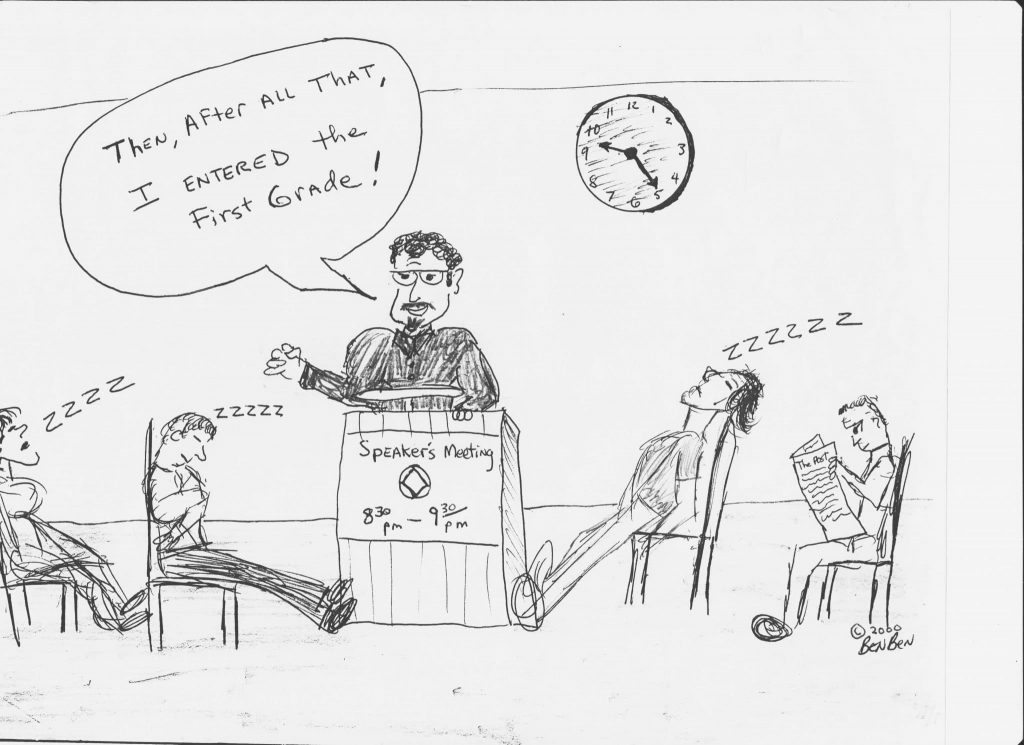 I first began drawing a few cartoons in the early 1980s while I was still drinking and drugging and working as a nurse at the National Institute of Health (NIH). I poked fun at the healthcare researcher’s behaviors I worked with, such as smoking cigarettes during their break. Confronted about my own using, I got clean 1/4/88 and began attending 12-step recovery meetings. I grew very close to my sponsor and the network of men I met. I was joking with a very special friend, the late Kevin A. from Virginia, and drew a cartoon for his anniversary about the topic of our amusement, a long winded speaker digressing into all aspects of growing up, and boring the audience.
I first began drawing a few cartoons in the early 1980s while I was still drinking and drugging and working as a nurse at the National Institute of Health (NIH). I poked fun at the healthcare researcher’s behaviors I worked with, such as smoking cigarettes during their break. Confronted about my own using, I got clean 1/4/88 and began attending 12-step recovery meetings. I grew very close to my sponsor and the network of men I met. I was joking with a very special friend, the late Kevin A. from Virginia, and drew a cartoon for his anniversary about the topic of our amusement, a long winded speaker digressing into all aspects of growing up, and boring the audience.
 Kevin kept that cartoon on his fridge for months. The local newsletter chair announced at a meeting the need for submissions of stories, poems or cartoons for the next publication. I copied and submitted the cartoon, which was well received. The chairperson asked me for another submission, so I went home, thought about it, and drew a second cartoon about a guy irate that a girl broke his anonymity, meanwhile he is wearing every N.A. clothing items possible and he has N.A. bumper stickers plastered all over his car. The newsletter wanted even more after that, but I explained, you know, those cartoons I drew were pretty funny, but I think I’m all tapped out of ideas.
Kevin kept that cartoon on his fridge for months. The local newsletter chair announced at a meeting the need for submissions of stories, poems or cartoons for the next publication. I copied and submitted the cartoon, which was well received. The chairperson asked me for another submission, so I went home, thought about it, and drew a second cartoon about a guy irate that a girl broke his anonymity, meanwhile he is wearing every N.A. clothing items possible and he has N.A. bumper stickers plastered all over his car. The newsletter wanted even more after that, but I explained, you know, those cartoons I drew were pretty funny, but I think I’m all tapped out of ideas.
 About a week later I was sitting in a hot tub with my wife, Beth, talking about the newsletter submissions and drawing cartoons. During our conversation I suddenly felt very inspired and realized, hey, wait a minute, I could draw all that funny stuff you see and hear in meetings and all the absurd situations in life that come up in recovery. Like a mad man on a mission, I started drawing cartoons every day. I called it my employment hobby, and drew many of them at work. It really helped that I was a nurse on a 28-day addiction treatment center where the patients provided a wealth of additional new material. I felt like I was pioneering new territory, as I had never seen any 12-step related cartoons before mine.
About a week later I was sitting in a hot tub with my wife, Beth, talking about the newsletter submissions and drawing cartoons. During our conversation I suddenly felt very inspired and realized, hey, wait a minute, I could draw all that funny stuff you see and hear in meetings and all the absurd situations in life that come up in recovery. Like a mad man on a mission, I started drawing cartoons every day. I called it my employment hobby, and drew many of them at work. It really helped that I was a nurse on a 28-day addiction treatment center where the patients provided a wealth of additional new material. I felt like I was pioneering new territory, as I had never seen any 12-step related cartoons before mine.
My artwork in the beginning was a little rough, but I felt the humor was there. After a couple years I had several hundred and wasn’t sure what to do with them. The monthly newsletter couldn’t keep up with me, so I searched for a new venue to present my work. I now had cartoons about every one of the 12 steps and most of the traditions, so I decided to categorize the cartoons accordingly. Another dear friend, Hugh M., helped me self-publish the first book entitled Recovery Cartoons, a beautiful hardcover limited edition. The following year my wife, Beth helped me produce the second book entitled Conference Approved as well as create our website www.recoverycartoons.com
Life drastically changed shortly thereafter with the birth of our twins Karen and Kevin (named in memory of Kevin A.). The focus of our lives shifted to raising these two wonderful gifts of our recovery. I still drew cartoons regularly, but never really pursued marketing and publishing anymore. Now, I often draw personal cartoons for greeting cards when my friends in recovery celebrate an anniversary. I met RT from www.intherooms.com at a N.A. convention and he loved the cartoons and has been publishing them regularly in the site’s newsletter, The Hitch.
In 2010 I retired from my clinical research nurse position at the treatment program and began teaching for the University of Maryland, School of Nursing. I coordinate the undergraduate psychiatric mental health program and am pursuing my PhD in nursing. My research topic is using humor to help those with substance use disorders. My results indicate that newcomers to 12-step recovery didn’t experience much humor in the last days and even years of using (not surprising). But now that they’re clean, in the program, it’s like the floodgates have opened and laughing and humor has re-emerged into their lives.
Recovering, they tend to find clean ways to have fun and really start enjoying life. Interestingly, what newcomers really seem to enjoy are the inside jokes you hear at meetings, that is jokes that only recovering addicts would really understand. Humor helps them engage and identify with the old timers, and supports them to feel part of these special groups. This identification and feeling of belonging is so vital to individuals that come in so broken. Typically, their lives have been shattered, and their friends and family hurt by their behaviors when drinking and drugging. The unconditional love and support found in the 12-step meetings and with a sponsor enable newcomers to change and grow in recovery.
In my future research, I hope to identify particular humor styles that might be helpful and well as maybe even hurtful, such as aggressive humor. I hope to publish another book someday, with my growing catalog of hundreds of new cartoons. I like the title Tradition Violations perhaps, to poke fun at those in the program that can get a little self-righteous and rigid. I would also like to expand my audience to include newspapers, magazines, daily calendars and greeting cards. We must all remember Rule 62 (look it up), and learn to laugh and have some fun in our recovery.






